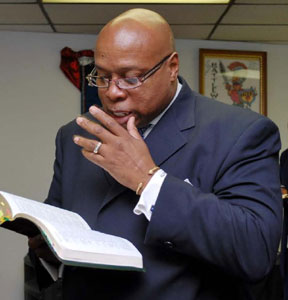
“Judge Elijah Williams: Hard truths”
By Pastor Rasheed Z Baaith
Part One
“For death is come up into our windows, and has entered into our palaces, to cut off the children from without, and the young men from the streets.” (Jeremiah 9:21)
I recently attended a symposium sponsored by the Broward County Crime Commission. It was entitled “Juvenile and Adolescent Violence: Why the Unthinkable Happens.” The topic was of course youth violence and the mental and emotional state of the youthful perpetrators of that violence.
Those of us in South Florida like those in places like Chicago, Los Angles, Houston, etc. are seeing our young people being killed and killing each other as if they have caught some kind of murder virus. The murders have been senseless, brutal, and unpredictable in which no young person or child is exempt from becoming a victim. And more often than not when we hear or see these all too familiar scenes of tears and blood, we wonder “why?”
The symposium attempted to answer that question. The panels included “Why, How, When, and Where Juvenile Violence Occurs”; “Lionel Tate: A Psychological Case Study of a Landmark Trial”; and a Juvenile Judiciary Panel. The Lionel Tate discussion is worth a column by itself, it was illuminating, and heartbreaking. We all remember that tragedy.
Those who were part of the Lionel Tate panel included the trial judge, the prosecuting attorney, the defense attorney, two of the forensic psychologists and Lionel Tate’s education development specialist while he was behind bars. The insights they all provided and the peek at what went on behind the trial scenes made the panel worthy of being televised. Too bad it wasn’t.
Judge Elijah Williams was a member of the Juvenile Judiciary Panel. It was composed of judges from all over Florida. When Judge Williams gives a presentation, it will do two things. It will be very humorous and it will punch you in the gut. He started his address by telling the audience that we were not going to like what he had to say and when he finished, many in the audience were in total agreement with him.
Judge Williams did not harangue the audience, but he did say, “I’ve been a juvenile delinquency judge for a decade and I have seen thousands of Black youth accused of taking property through the use of a weapon, force, intimidation or violence. But, during this same time frame, I’ve only observed about five white boys accused of the same. So we need to admit that juvenile and adolescent violence is overwhelmingly a Black juvenile problem, and we need to address it as such.”
Judge Williams didn’t stop there. He went on to say, “When youth show up in my court room, I am aware of the societal problems caused by single-parent homes, poverty, living in a bad neighborhood, and other related issues. However, I don’t have the ability to fix these underlying causes, so I focus solely on the character development of the child in front of me.”
That may sound harsh but truth of-ten is. But Judge Williams does more than just give astute observations, he is an active supporter and participant of the PROMISE Program for juveniles and during the symposium, Broward Chief Judge Peter Weinstein gave praise to Judge Williams for the program’s creation.
The PROMISE acronym stands for “Preventing Recidivism through Opportunities, Mentoring, Intervention, Support, and Education.”
The program has proven to be successful to the point of receiving national recognition. Next week you’ll learn why.
